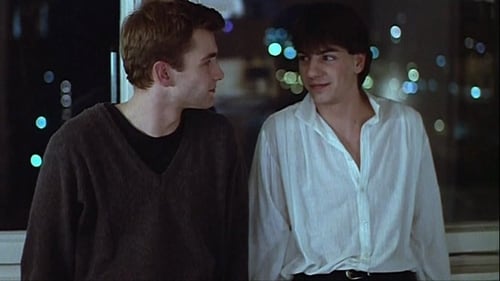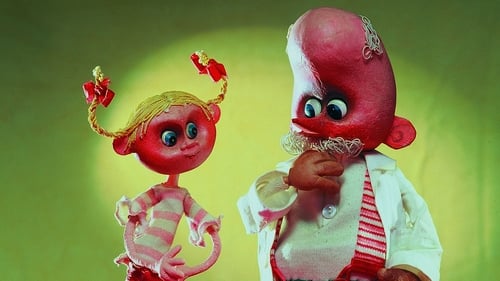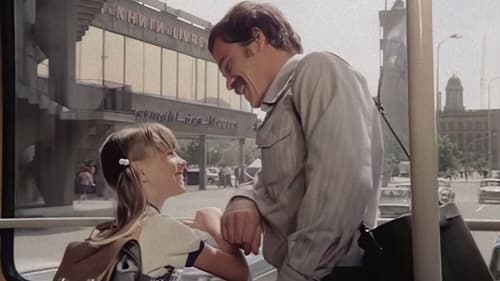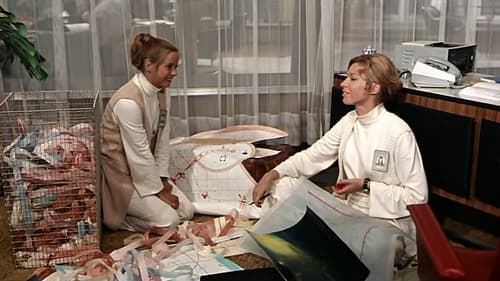Evelyn Opoczynski
Nacimiento : 1949-12-10, Berlin, Germany

Mutter des Jeans-Jungen (uncredited)
Berlín Oriental. El joven maestro Philipp conoce más de cerca a su colega Tanja tras un accidente en la escalera de la escuela y ambos comienzan una relación. Un antiguo amigo de Tanja, Jakob, al que llama cariñosamente Redford, resulta ser un amor de juventud de Philipp. Los padres de Philipp habían terminado la relación, regalando a Jakob una caja de compases y una bicicleta como compensación. Tras el reencuentro, Philipp entra en crisis, huye hacia un bar gay, se emborracha y finalmente dos desconocidos lo llevan a casa. Uno de ellos, el joven Matthias, lo encuentra de nuevo poco después frente al teatro y comienza un escarceo amoroso con él. Philipp tiene que enfrentarse a su propia orientación sexual, pero no tiene las fuerzas para ello. (FILMAFFINITY)


Olli, the main character in the movie, got a very bad grade and is terribly annoyed. She runs away from home and, together with a dog and a horse, finds a (mad? nutty?) scientist in a windmill. They experience the strangest adventures in this windmill and find other interesting characters, a lot of excitement and peril. While you may well interpret something as the "socialist value system" into this movie, it is more meant to be a children's movie, showing the kids that there are more exciting things out there than the ones that your parents and teachers show you, and that you will only find out most of those things on your own, if you show enough curiosity.

Lisa

Bettina
East Germany 1978. Karoline and Robert, teenagers who used to live in the same house until Robert's family moved, meet again at this year's holiday-camp. First love, first nude experience, first self-made theatre performance of "Romeo and Juliet". A look at the east-German youth in the late seventies.

Petra

A story about Ulrike, a ten year old girl who is looking for a new father with energy and determination.

Manuela Zacharias

Lisa

Mitabeiterin von Professor Scholl
Ocho naves espaciales desaparecen en las cercanía de la estación espacial Margot. La profesora Maria Scholl junto con el consejo mayor ordena la prohibición de vuelo al resto de naves espaciales.Sin embargo, una nave escapa de la Tierra y se pierde la comunicación con la nave espacial.

Andrea
Comedy about the "Husarenstreich", the 1757 Berlin raid during the Seven Years' War.

Angelika
When 17-year-old Angelika moves to Leipzig, she is forced to rent a room at Mrs. Häublein’s for a start, since her parents will not follow until a few months later. Fellow tenant Thomas, a philosophy student, is not at all enthused about his new, pretty housemate. Because of Angelika he has to move into a smaller room. Furthermore, he is annoyed at her many male acquaintances, without sensing that his aggression might be prompted by jealousy. When Angelika’s father comes for a visit, he asks Thomas to keep an eye on his daughter. Thomas takes this assignment very seriously and finally realizes that he has fallen in love with Angelika.

East German television film.

Anna Maria Boehme
A day before the beginning of the Second World War, a young resident of Bydgoszcz falls in love with a German teenager.

Nora Werner
Karin, who is in her mid-thirties, works as registrar but has been divorced for several years. Together with her 16-year old daughter Nora, she leads a happy and independent life. Then, she finds a new partner in the mathematician Peter, but does not tell her daughter about him. When Peter proposes marriage, Karin always comes up with new excuses why such a step is still too early for her. She mainly fears that Nora would not be able to cope with another marriage of her mother. But when Peter cannot be dissuaded anymore by her excuses and finally wants to marry her, Karin comes up with a bizarre plan.

Sybille
The adventures of three friends from East Germany on the Black Sea.

High-school senior Peter considers the adults around him to be hypocritical, self-congratulatory, and immersed in the past. He gets suspended for writing an essay that his teachers consider to be a challenge to the state. Just Don't Think I'll Cry became one of twelve films and film projects-almost an entire year's production-that were banned in 1965-1966 due to their alleged anti-socialist aspects. Although scenes and dialogs were altered and the end was reshot twice, officials condemned this title as "particularly harmful." In 1989, cinematographer Ost restored the original version, and this and most of the other banned films were finally screened in January 1990. Belatedly, they were acclaimed as masterpieces of critical realism.








